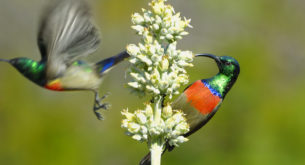The world’s fastest land animal, the cheetah, will return to India after a 70-year absence in the wild. The plan is to reintroduce eight cheetahs, five males and three females from South African captive facilities into a Kuno National Park. If successful, the 8 405 km journey will be the first cheetah reintroduction to the wild across two different continents.

The Cheetah in India
Up until the 20th century, the Asiatic cheetah was common throughout India. The word ‘cheetah’ was even derived from the Sanskrit word ‘chitraka,’ meaning ‘spotted.’ The Asiatic cheetah was a subspecies of the cheetah that once ranged over the grasslands of India, Pakistan, Russia, Iran and the Middle East.
Today, the Asiatic cheetah is a critically endangered cat, where the last remaining ones are dispersed over the rugged hinterlands of Iran, with none in captivity. The cheetah was the only large mammal to go extinct in India since the country’s independence.
According to BBC’s India correspondent, Soutik Biswas, three factors were instrumental in the regional extinction of the Asiatic cheetah; hunting, diminishing habitat, and non-availability of enough prey. During British rule, cheetahs were largely eliminated through bounty hunting because the cats were thought to enter villages and kill livestock.
Since the 1950s, India has made efforts to reintroduce the animal. In the 1970s, an agreement with Iran was made, which had 300 cheetahs at the time. This plan failed after the Shah of Iran was overthrown during the Iranian revolution, and negotiations stopped.
At the 2019 Conference of Parties to the United Nations Convention to Combat Desertification (UNCCD COP14), a researcher from the Indian delegation commented that desertification is the primary cause of the cheetah’s extinction in India.
This pronouncement generated great debate and critique in India, even though it is not completely correct. It also brought about the realisation that wild cheetahs no longer existed in India, and India has once again shown interest in the project, looking towards South Africa.
Reintroducing cheetahs to India
There is cause for concern regarding the introduction of the African subspecies into India, where the Asiatic cheetah is smaller, thinner and slightly paler than its African counterpart, with a smaller head and shorter legs.
There are concerns that the African species could introduce diseases to the subcontinent. Even though the cheetahs will be vaccinated for rabies, Abi Vanak, a senior fellow at Ashoka Trust for Research in Ecology and the Environment believes that because these are captive cheetahs being sourced from captive conditions, there are multiple considerations to keep in mind.
‘While the animals being brought will likely be vaccinated against rabies and canine-transmitted diseases, cheetahs, like other carnivores, will be at risk of exposure to the canine distemper virus, feline infectious peritonitis (caused by a feline coronavirus) and feline leukaemia virus (FeLV), particularly in captive conditions,’ Says Vanak. ‘The stress of new and unfamiliar conditions could lead to greater susceptibility to such infections.’
Another issue is the cheetahs’ adaption to hunting prey, where a lot of their new habitat is not suitable for cheetahs. Cheetahs are being reintroduced in an effort to spruce up their critically imperilled grasslands and savannah often dismissed as ‘wastelands’ by policymakers.
But expert opinion is being sought out, and collaboration with South African experts is underway. Vincent van der Merwe, a cheetah conservationist based in South Africa, visited India in April to evaluate potential sites for reintroduction.
He found that the Kuno National Park was a favourable habitat for the cat. The park is 730 sq km, with a mixed woodland-grassland habitat, which he says is similar to where cheetahs thrive in South Africa.
In the meantime, cheetahs are expected to arrive in India within the next six months. The project will be spearheaded by the National Tiger Conservation, where there are ambitious plans to source 40 cheetahs over the next five years.
Picture: Getaway Gallery
ALSO READ
Maputo Special Reserve welcomes cheetahs after 60-year absence

















